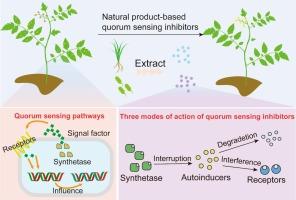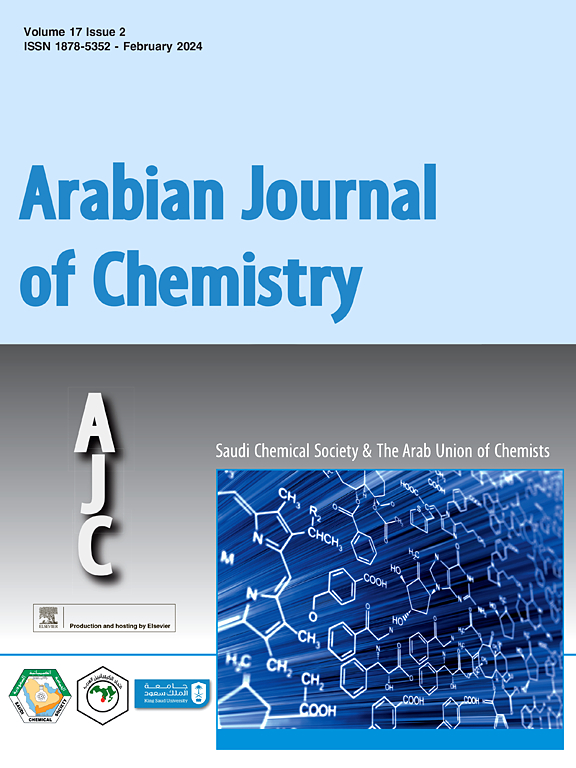Application of natural product-based quorum sensing inhibitors in plant pathogen control: A review
IF 5.2
2区 化学
Q2 CHEMISTRY, MULTIDISCIPLINARY
引用次数: 0
Abstract
Quorum sensing (QS), an intercellular communication process, depends on the generation, release, and detection of extracellular signaling molecules (autoinducers). Upon binding to their corresponding receptors, these autoinducers activate target genes, regulating various bacterial activities including bioluminescence, swimming and swarming motility, symbiosis, protein secretion, plasmid exchange, secondary metabolite production, and biofilm development. Many interactions between plants and microorganisms depend on bacterial QS systems, making them a powerful tool for regulating plant growth and controlling plant pathogens. As QS research deepens, more QS inhibitors (QSIs) emerge, exhibiting diversification. According to its structure, QSIs can be divided into furanone, lactone, substituted Homoserine Lactone (HSL), and Autoinducing Peptide (AIP), further divided into natural products and synthetic products. Natural QSIs primarily originate from animal, plant, and microbial sources. Thereby, QSIs play an important role in plant pathogen control. In order to systematically summarize and extend the application potential of natural product as vital antibacterial active constituent, the mechanisms and applications of natural product-based QSIs in plant pathogen control were discussed and highlighted. We hope this review will provide the comprehensive understanding of the function and underlying action mechanism of natural product-based antimicrobial molecule, and inspire the development of new bactericides targeting QS mechanisms.

基于天然产物的法定量传感抑制剂在植物病原体控制中的应用:综述
法定量感应(QS)是一种细胞间通信过程,取决于细胞外信号分子(自诱导物)的产生、释放和检测。与相应的受体结合后,这些自诱导物会激活目标基因,从而调控细菌的各种活动,包括生物发光、游动和群聚运动、共生、蛋白质分泌、质粒交换、次级代谢物产生和生物膜发育。植物与微生物之间的许多相互作用都依赖于细菌 QS 系统,使其成为调节植物生长和控制植物病原体的有力工具。随着 QS 研究的深入,越来越多的 QS 抑制剂(QSIs)涌现出来,并呈现出多样化的趋势。根据其结构,QSIs 可分为呋喃酮类、内酯类、取代的高丝氨酸内酯(HSL)和自诱导肽(AIP),并进一步分为天然产物和合成产物。天然 QSIs 主要来源于动物、植物和微生物。因此,QSIs 在植物病原体控制中发挥着重要作用。为了系统地总结和扩展天然产物作为重要抗菌活性成分的应用潜力,本文重点讨论了基于天然产物的 QSIs 在植物病原体控制中的机制和应用。希望这篇综述能为全面了解基于天然产物的抗菌分子的功能和潜在作用机制提供帮助,并为开发针对 QS 机制的新型杀菌剂提供启发。
本文章由计算机程序翻译,如有差异,请以英文原文为准。
求助全文
约1分钟内获得全文
求助全文
来源期刊

Arabian Journal of Chemistry
CHEMISTRY, MULTIDISCIPLINARY-
CiteScore
10.80
自引率
3.30%
发文量
763
审稿时长
63 days
期刊介绍:
The Arabian Journal of Chemistry is an English language, peer-reviewed scholarly publication in the area of chemistry. The Arabian Journal of Chemistry publishes original papers, reviews and short reports on, but not limited to: inorganic, physical, organic, analytical and biochemistry.
The Arabian Journal of Chemistry is issued by the Arab Union of Chemists and is published by King Saud University together with the Saudi Chemical Society in collaboration with Elsevier and is edited by an international group of eminent researchers.
 求助内容:
求助内容: 应助结果提醒方式:
应助结果提醒方式:


